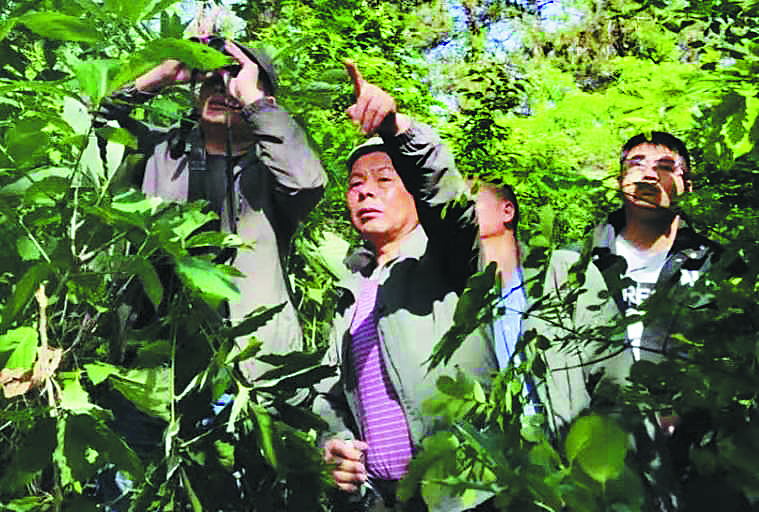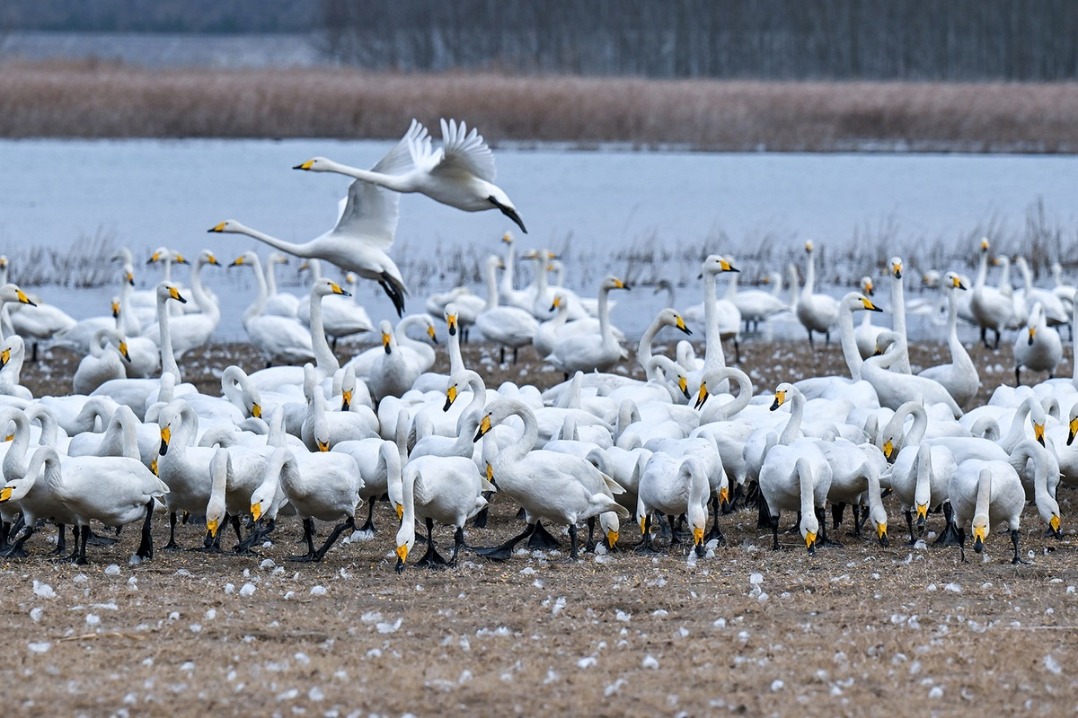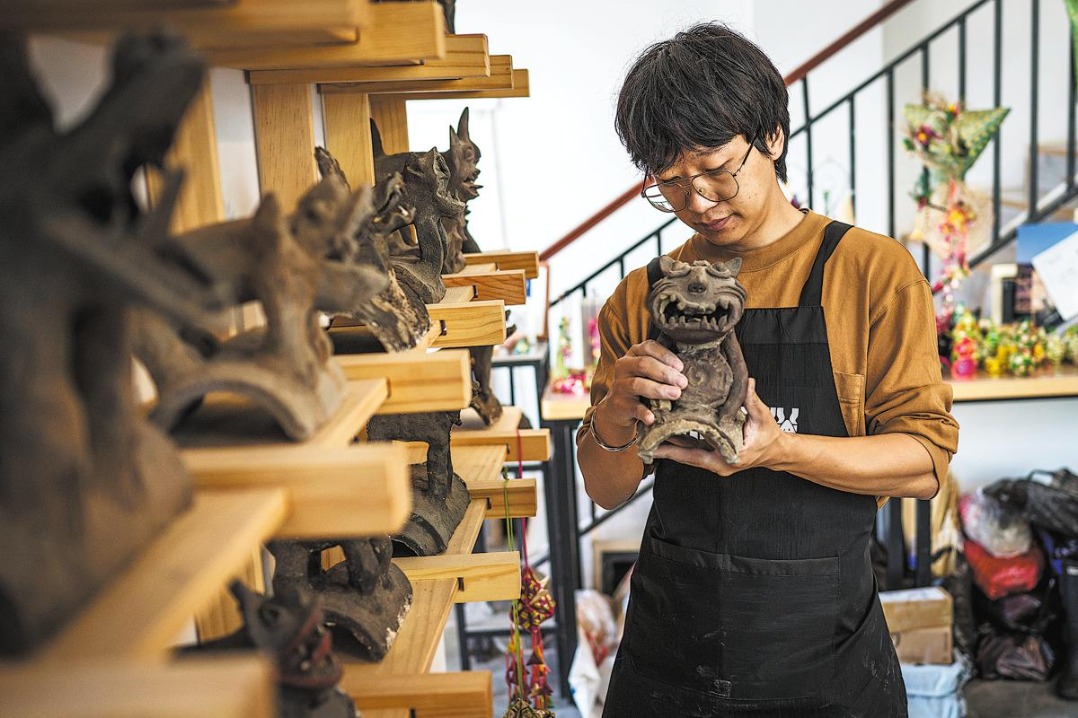Extended efforts aid survival of rare ibises


Huang Zhixue, a native of Shaanxi province, made the "foreign land" of Henan province his home after he undertook a mission to protect the crested ibis and help ensure the survival of the species in Central China.
In the 1980s, a team from the Institute of Zoology at the Chinese Academy of Sciences spent three years in Shaanxi's Yangxian county looking for the rare birds, but only found traces of seven.
The situation had hardly changed by 1990, when Huang, then 27, joined a group of conservationists working to protect the species in Yangxian.
The Yangxian native worked as a field monitor when he graduated from high school. In the wild, crested ibises live in deep forests, so he and his colleagues were on duty day and night near the nesting area, and they took the chicks to the local shelter to care for them.
In 1994, Huang was transferred to a breeding center in Shaanxi, where he helped raise and care for several new generations of the birds.
In 2007, the Dongzhai National Nature Reserve in Xinyang, Henan, received central government approval to conduct off-site conservation work. Huang was invited to work on the project.
Today, thanks to decades of hard work by him and his peers, the number of crested ibises in the wild around Luoshan county, Henan, has risen to more than 400.
Seventeen crested ibises arrived at Dongzhai in 2017: the first four were brought from the Beijing Zoo, while 13 were returned from Japan.
From 1998 to 2018, China gave seven crested ibises to Japan, so those bred there are all descendants of the Yangxian wild crested ibises.
To prevent inbreeding, Huang decided to pair mature male birds from Beijing with females that had been brought back from Japan. The keepers worked hard to get two pairs of newly matched crested ibises to breed, but a sudden heavy snowfall interrupted the plan.
"The weather was abnormal that year. It snowed heavily in the mountains for more than 20 days," Huang said, adding that the temperature fell far below freezing and the snow was more than 30 centimeters deep.
The 13 birds from Japan were especially afraid of animals and humans, and several were injured in fights among the birds, Huang said.
To protect them, Huang laid plastic film on the exterior of their cage and placed infrared lamps inside to keep them warm in the cold weather. In 2008, six eggs were harvested, five of which were fertilized under the keepers' care.
Huang mixed loaches, egg yolks, apples and insects with a meat sauce, which was then thinned and fed to the young birds via a straw. The keepers fed the birds every two hours and cleaned and tidied their incubation room every 90 minutes.
Now, dozens of birds are born at the facility every year. "During the incubation period, the smell in the feeding room is very unpleasant," Huang said, adding that working in such an environment for a long time makes the keepers feel dizzy and upsets their stomachs.
He and his colleagues provide rudimentary survival skills to help the ibises adapt to life in the wild and enable them to thrive in the natural environment.
The birds are trained for at least seven months in a field covering more than 2,000 square meters, and Huang's team helps them perfect their ability to perch in the upper branches of high trees — which helps to ensure their safety in the wild — and their ability to fly long distances.
Factors that affect the survival of crested ibises in the wild include predators, disease, bad weather and difficulty in foraging.
Since 2013, the Dongzhai National Nature Reserve has been releasing crested ibises, which are then monitored by satellite positioning, radio telemetry and human tracking methods.
From March to June every year, the birds' breeding season, Huang's team searches in the wild for nests and protects the chicks.
Four staff members usually check five nests a day, with the farthest being more than 100 kilometers from their workstation.
Huang, who is proud of his role in helping to protect the birds, lives in Xinyang with his family. Both of his daughters have married and settled in the area.
"I didn't think too much back then (in the 1990s) about moving to another place. No matter where I live, it is important that I can still take care of the birds," he said.
Next, he wants to see the birds spread across a wider area, such as Hubei and Anhui provinces.
He also hopes that more people, especially those who live near the birds' habitats, will become more aware of the rare species and help protect the birds by reporting each and every sighting.
- Multiple cities probe illegal activities in 'private cinemas'
- Xi presents orders to promote two military officers to rank of general
- New penalties planned for violations related to radioactive waste management
- Best practices in youth cultural exchange released at Chongqing conference
- Yearender: China's 2025 space endeavors have seen new milestones
- HR conference sparks discussion on talent potentials in AI era





































